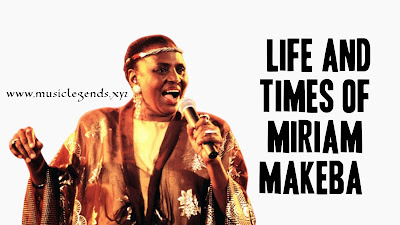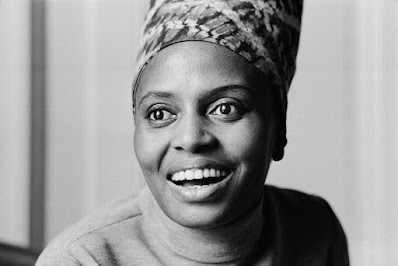LIFE AND TIMES OF MIRIAM MAKEBA

Zenzile Miriam Makeba was born in Prospect Township area of Johannesburg, South Africa, on March 4th, 1932.
TOP 75 MIRIAM MAKEBA SONGS PLAYLIST [VIDEOS]
This great South African musical icon who was also called Mama Africa, aside from being a singer, was also an actor, human rights activist (who used her music to radically fight against Apartheid in South Africa) and a one-time U.N Goodswill ambassador.
Her genre of music did cut across World Music, Marabi, Jazz, even to Afropop.
This strong woman of Africa is a testimony of how a life of adversity could turn out to be a huge success in the end. Losing her father at a very tender age, Miriam was forced to get some form of employment or the other as a child.
Her first marriage, at age 17 was quite brief and it was more like an hell-on-earth experience to the young lady, Miriam, who also survived breast cancer.
She started singing professionally at a very young age, sometimes in the 1950s. Miriam Makeba started her musical career with the Manhattan Brothers and the Skylarks (an all female musical group). Her role in the 1959 anti-apartheid blockbuster movie - Come Back, Africa - immediately brought international recognition her way. This movie paved the way for her to perform in London, Venice and New York. Miriam moved to New York in 1960 where she recorded her first musical album.
Her life in its later course got riddled with political mess which arose from her marriage to a leader of the Black Panther Party (A powerful African-American civil rights movement group), Stokely Carmichael in 1968, which saw their eviction from the U.S to Guinea shortly afterwards. She was not totally free from the thick web of political intrigues until the total scraping of the Apartheid system in South Africa.
Until 1990, Miriam was not allowed entry into her country as the pre-dominantly white-ruling-class of the Apartheid regime would not allow her to.
The stylish Miriam Makeba had over 30 albums to her name before her demise on November 9th, 2008, they include:
- Ilanga (1959)
- Miriam (1960)
- Mbube (1963)
- The Many Voices of Miriam Makeba (1963)
- An Evening with Belafonte/Makeba (1966)
- Pata Pata (1967)
- Lumumba (1970)
- Malcolm X (1974)
- Soweto Blue (1977)
- Comme une symphonie d'amour (1979)
- The Queen of African Music (1987)
- Sangoma (1988)
- Welela (1989)
- Eyes on Tomorrow (1991)
- I Shall Be Released (1991)
- Homeland (2000)
- Malaika
Among Others.
One thing that was notable about this multi-talented and versatile African Queen is the fact that Miriam Makeba performed in numerous African languages but refused to ever and actually never performed in the natively White-Apartheid 'Afrikaans' language.
To this day Miriam Makeba stands out as the most honoured female musician from Africa with numerous awards to her name including a Grammy Award for her 1966 album.
'Mama Africa' through her thriving and successful career never wore makeup nor would she wear wig or straighten her hair, she also originated the fashion trend we all know today as the 'Afro Look'.

















